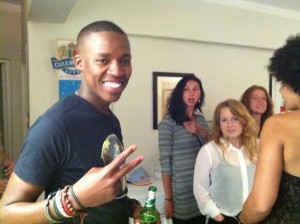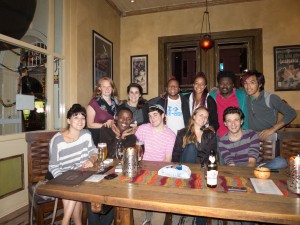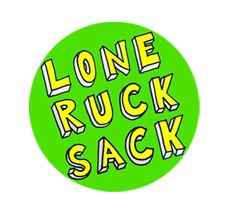The Art of Lone-liness
Cape Town 2012
There’s a certain spot in Cape Town where the road suddenly dips and there she is— the Mother City spread like a carpet to the sea, Table Mountain looming in darkness and the city aglitter.
In October 2012, I crested that hill for the first time, windows down and the summer breeze tangling my dusty hair. Just a few moments earlier I was exhausted from the long flight from Dakar, but after seeing Cape Town at night I wasn’t tired anymore.
Ten minutes later the taxi pulled up in front of my hostel, a sprawling building on a hill underneath the shadow of Lion’s Head mountain. I hauled my backpack and duffel out of the back of the taxi, paid the driver, and was buzzed in through the front gate into a crowded scene. To the right was an elevated patio complete with a pool table and crowd, beer bottles perched on ledges and flying cue sticks. Behind a long wall of glass there was a bar with sofas and armchairs where people were perched watching a rugby game while drinking Savannah and playing cards.
I dropped my bags in front of the reception— it was so late the desk was no longer open, and the security guard was struggling to find the key to the 4-bed dorm I was staying in that night. While I stood there, planning on getting a shower and feeling awkward in the crowd, a tall guy with a huge smile and a Zulu accent walked up to me. “Hey, want to come out with us tonight?”
His name was Lucas, and he was the bartender at the hostel. He had a slow, almost lazy drawl to his voice, like he was never in a hurry. He slowly scanned the room in that laid back way I would come to associate with Lucas, before coming back to me standing there in my harem pants and filthy tank top. “Let’s do it,” I said, grinning. When the guard came back with the key, I tossed my bags in the room, and joined the group heading out on the town.
It was the first of many nights out in Cape Town, but I vividly remember that first one. It was the first night in a long time I felt I was in a place where I belonged.
* * *
Loneliness and solitude are often present together, but they are not the same. Humans need communities and a sense of belonging, but not all of us can find that in an established society. Some of us find these things on the road, with people we don’t know well in wild places. We test our limits, find our very basic needs, and come to realize who we are when we’re forced to rely on no one but ourselves.
To live a nomadic life is to come to terms with loneliness, as well as solitude— it’s a lifestyle of being alone. It’s wildly exciting and difficult, it’s the decision to pursue a life of curiosity, to not see family and old friends for long periods of time, and be comfortable living in the realm of the constant unknown.
I’ve been living life as a nomad for the past 5 years now, stopping occasionally to work before heading out on another adventure. Being a nomad is something I think constantly about, what it means, what I’m giving up, and who I want to be as a person. When I first left the American workforce to try an alternative lifestyle in 2012, being a nomad was a new and novel idea— and while I was very aware of what I was leaving back in the states, I was new to what I would be giving up on the road.
When constantly evolving and learning and leaving, there are many beginnings, but endings become fewer. Less people become good friends, more people become acquaintances. I no longer feel the need to actively trade Facebook info or emails, because I’ve realized most people and moments are fleeting— but I appreciate them more as I recognize this. I’ve learned to chase after opportunities and experiences and love, and live in these moments— all while realizing they most likely won’t come again.
* * *
Cape Town 2012
The next few months were a blur of meeting new people every day, of hanging out with fellow travelers and my friend Lucas at the bar every night, and taking trips to other cities in-between.
Every time I came back to Cape Town, Lucas would be at that bar. I’d ask for a beer and about whatever music was playing and what was going on that night. He’d give me a hard time in that drawling voice about how I’d never find whatever music he was playing, because it was a rare song or a local group. We’d go out to whatever place was popular or had something going on that night, whether it was dollar shots or a great DJ or club.
When I moved into my apartment in Cape Town with my two roommates, Lucas showed up with pounds of Boerewors and pork for a Braai (a South African BBQ)— a Braai we had to have indoors because we didn’t have a patio or balcony. I still remember him in that tiny kitchen over a frying pan cooking up all that meat with a beer in his hand.
One night, hanging out at the hostel, Lucas played an intense song I’d never heard before— Asaf Avidan’s Reckoning Song, a piano version.
“Lucas,” I said, “this song is seriously amazing.”
“You’ll never find it,” he told me. “It’s a rare version.”
It was such a small moment in time, Lucas cleaning up the bar, while I sat there drinking a Savannah, listening to this song about lost moments. It was so simple, such an inconsequential moment, much like any of the moments I’ve had on the road with people I’ve met— but I think about that one particular night often, hanging out on a sofa drinking a cider in Cape Town— Lucas would play that song, and I’d think about my life and how I wanted it to be.

* * *
When we choose to move on, we always leave something behind. Unfortunately, because of the physicality of this world, we often think leaving something behind is as simple as forgetting a sweater in the park— something tangible that can be retrieved at a later date. When we leave a place or a person behind, that leaving forever alters that person and that place by our not being there. Then other people will come, and change them, so when we return it’s no longer the same as the moment we left.
This is the single, most important lesson I’ve learned from my nomadic life. It’s both the most beautiful and profoundly sad thing I’ve ever realized. It’s made me see the weight of my decisions and the value of people in my life, and made me think actively about what people I want in my life for more than just fleeting moments and beginnings.
We’re not always in charge of those decisions ourselves. Sometimes, life makes them for us.
* * *
A few weeks ago, I saw a post from a South African friend on Facebook — one of her friends had passed away suddenly. It was Lucas. I checked my messages, and re-read the last one he had sent me. I couldn’t reconcile that last message and the Facebook post. Lucas was in Cape Town. He was there, like he had been every time I had come back before. He’d be at that bar, I’d ask for a beer, and we’d listen to music and talk about whatever.
But Lucas wasn’t there. He was traveling with his girlfriend in Kenya, where he contracted meningitis and suddenly passed away. He was also pursuing life, with someone he loved, in an unknown wild place. My expectation of him being in Cape Town is just a memory frozen in time, of the person he was when we were both in South Africa— a beautiful moment that ended as soon as I left.

* * *
Nomadic life is hard. It’s not all idyllic sunsets and adventure and surfing on some exotic beach. It’s solitary, sometimes lonely. It’s about leaving things behind, it’s about trying to find where we belong in a world of tiny exquisite things and realizing those significantly insignificant moments create a bigger life. My time here is fleeting, and the people and places I meet along the way forever change me.
This lifestyle is about running toward something— toward belonging, toward understanding, toward knowledge or adventure. I’ve never regretted my decision to hit the road— I just never realized until recently some places can’t be gone back to. I wasn’t acquainted with that delicate, empty space where things once stood that could never be again. I am now.
What we do with time, how we use it to shape and change the people and places around us is a uniquely personal decision. Time is the greatest commodity we have as humans, our fragile existence circling the sun at the same speed, every day, under a smattering of distant, glittering stars.
